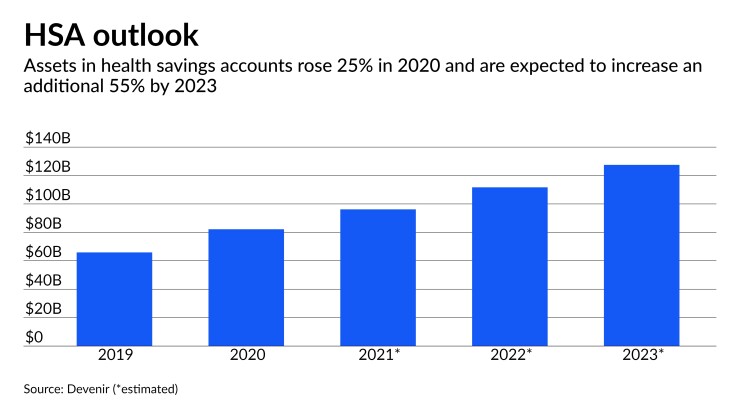BMO Harris Bank saw demand growing for health savings accounts, but the Chicago bank worried its offerings were too plain for such a fast-evolving market.
The $159.2 billion-asset BMO’s current HSAs resemble a standard checking account. They lack digital tools that analyze spending or record health care receipts and others that could help individuals maximize the advantages of HSAs, a type of savings account meant to cover deductibles, copayments and other health insurance expenses.
The bank plans to change this soon, with the help of a fintech partner.
The need to offer a more tech-savvy HSA is becoming stronger as high-deductible health plans become more common among employers and interest in HSAs rises in tandem. HSAs are only available to members of high-deductible plans; these users contribute funds on a pretax basis, earn interest that is tax-deferred and withdraw the money without paying taxes on it. Assets in HSAs totaled $82.2 billion by the end of 2020, a 25% increase over 2019, according to Devenir Research’s 2020 Year-End Devenir HSA Market Survey.

“We are at a tipping point in employee benefits where high-deductible health plans are regularly replacing traditional deductible plans,” largely to keep premiums affordable, said Amy O’Meara Chambers, chief operating officer and co-founder of HealthBridge Financial, a health care benefits company in Grand Rapids, Michigan. “The large financial institutions are seeing this wave coming and understand that the contributions, not to mention the rollovers and transfers from other accounts, add up quickly.”
Today, BMO Harris, a unit of BMO Financial Group in Toronto, lets customers deposit funds directly or through their employers. They also get a dedicated debit card.
“But our customers don’t have a digital experience with HSA-specific features they might want,” said Ben Schack, head of retail deposit products for the U.S. division of BMO.
To step up its digital game, BMO turned to Lively, an HSA record-keeper and administrator in San Francisco that offers accounts directly to consumers, to employers and now to financial institutions like BMO. The bank will safeguard HSA deposits, but Lively will take over record-keeping, tax reporting and customer service, starting with new BMO accounts this fall and then existing account holders in 2022.
Kevin McKechnie, executive director of the American Bankers Association’s Health Savings Account Council, estimates that 2,500 financial institutions administer HSAs. By partnering with a fintech such as Lively or Starship, banks can attract customers with more robust features and offload the work of building these features themselves. These differentiating tools may become more important as more banks want in.
“The HSA industry is growing rapidly, and we didn’t feel like our offering was as competitive as we wanted it to be,” said Schack. “More importantly, as we put on our customer hats, we felt we could do more to help our customers make real financial progress.”
BMO chose Lively because, Schack says, it offered a distinctive digital experience. Customers will log into a portal co-branded by BMO and Lively where they can access their accounts and monitor progress toward meeting their deductibles. A feature called Expense Scout will use artificial intelligence to scan a linked credit card or bank account to unearth HSA-eligible expenses. The portal will also offer investment options and the ability to add a new expense to a queue where the user can request reimbursement at a later date. Employers will get a dashboard to help them add or remove employees from a plan and manage contributions.
These kinds of elements “are going to be table stakes,” said Chambers. “You can’t offer yesterday’s HSA platform. Consumers are going to demand more.”
There are other reasons banks may soon enhance their offerings or embrace HSAs for the first time.
At the end of 2020, the Federal Deposit Insurance Corp. issued a rule that clarified that HSAs are not considered brokered deposits, which are more heavily regulated.
“It’s one of those things that reassures banks about the low risks of entering this business in the first place,” said McKechnie.
Adding HSAs to a bank’s product lineup also makes sense when the institution is already trying to capture a customer’s checking account, home loan and retirement fund.
“Even though the HSAs have been around for a decade and a half, they are coming to the forefront,” said Chambers.
On BMO’s end, “We’ve always liked HSAs, and I think other banks do, too, because they are an unequivocal good for consumers,” said Schack. “They have tax advantages and they are stable deposits where customers like to build those balances over a long time.”
BMO also announced a strategic investment in Lively on June 24 but didn't disclose the dollar amount. Lively works with thousands of employer groups and has signed contracts with two other financial institutions.
“Our hope is by giving customers a best-in-class digital experience and the right tools to manage these funds, more will adopt HSAs and the customers we already have will feel empowered to build their balances,” said Schack.





